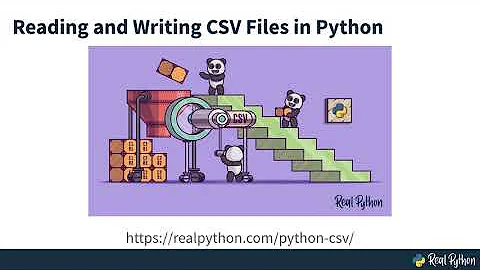Can pandas automatically read dates from a CSV file?
Solution 1
You should add parse_dates=True, or parse_dates=['column name'] when reading, thats usually enough to magically parse it. But there are always weird formats which need to be defined manually. In such a case you can also add a date parser function, which is the most flexible way possible.
Suppose you have a column 'datetime' with your string, then:
from datetime import datetime
dateparse = lambda x: datetime.strptime(x, '%Y-%m-%d %H:%M:%S')
df = pd.read_csv(infile, parse_dates=['datetime'], date_parser=dateparse)
This way you can even combine multiple columns into a single datetime column, this merges a 'date' and a 'time' column into a single 'datetime' column:
dateparse = lambda x: datetime.strptime(x, '%Y-%m-%d %H:%M:%S')
df = pd.read_csv(infile, parse_dates={'datetime': ['date', 'time']}, date_parser=dateparse)
You can find directives (i.e. the letters to be used for different formats) for strptime and strftime in this page.
Solution 2
Perhaps the pandas interface has changed since @Rutger answered, but in the version I'm using (0.15.2), the date_parser function receives a list of dates instead of a single value. In this case, his code should be updated like so:
from datetime import datetime
import pandas as pd
dateparse = lambda dates: [datetime.strptime(d, '%Y-%m-%d %H:%M:%S') for d in dates]
df = pd.read_csv('test.dat', parse_dates=['datetime'], date_parser=dateparse)
Since the original question asker said he wants dates and the dates are in 2013-6-4 format, the dateparse function should really be:
dateparse = lambda dates: [datetime.strptime(d, '%Y-%m-%d').date() for d in dates]
Solution 3
You could use pandas.to_datetime() as recommended in the documentation for pandas.read_csv():
If a column or index contains an unparseable date, the entire column or index will be returned unaltered as an object data type. For non-standard datetime parsing, use
pd.to_datetimeafterpd.read_csv.
Demo:
>>> D = {'date': '2013-6-4'}
>>> df = pd.DataFrame(D, index=[0])
>>> df
date
0 2013-6-4
>>> df.dtypes
date object
dtype: object
>>> df['date'] = pd.to_datetime(df.date, format='%Y-%m-%d')
>>> df
date
0 2013-06-04
>>> df.dtypes
date datetime64[ns]
dtype: object
Solution 4
When merging two columns into a single datetime column, the accepted answer generates an error (pandas version 0.20.3), since the columns are sent to the date_parser function separately.
The following works:
def dateparse(d,t):
dt = d + " " + t
return pd.datetime.strptime(dt, '%d/%m/%Y %H:%M:%S')
df = pd.read_csv(infile, parse_dates={'datetime': ['date', 'time']}, date_parser=dateparse)
Solution 5
pandas read_csv method is great for parsing dates. Complete documentation at http://pandas.pydata.org/pandas-docs/stable/generated/pandas.io.parsers.read_csv.html
you can even have the different date parts in different columns and pass the parameter:
parse_dates : boolean, list of ints or names, list of lists, or dict
If True -> try parsing the index. If [1, 2, 3] -> try parsing columns 1, 2, 3 each as a
separate date column. If [[1, 3]] -> combine columns 1 and 3 and parse as a single date
column. {‘foo’ : [1, 3]} -> parse columns 1, 3 as date and call result ‘foo’
The default sensing of dates works great, but it seems to be biased towards north american Date formats. If you live elsewhere you might occasionally be caught by the results. As far as I can remember 1/6/2000 means 6 January in the USA as opposed to 1 Jun where I live. It is smart enough to swing them around if dates like 23/6/2000 are used. Probably safer to stay with YYYYMMDD variations of date though. Apologies to pandas developers,here but i have not tested it with local dates recently.
you can use the date_parser parameter to pass a function to convert your format.
date_parser : function
Function to use for converting a sequence of string columns to an array of datetime
instances. The default uses dateutil.parser.parser to do the conversion.
Related videos on Youtube
Roman
Updated on July 08, 2022Comments
-
Roman almost 2 years
Today I was positively surprised by the fact that while reading data from a data file (for example) pandas is able to recognize types of values:
df = pandas.read_csv('test.dat', delimiter=r"\s+", names=['col1','col2','col3'])For example it can be checked in this way:
for i, r in df.iterrows(): print type(r['col1']), type(r['col2']), type(r['col3'])In particular integer, floats and strings were recognized correctly. However, I have a column that has dates in the following format:
2013-6-4. These dates were recognized as strings (not as python date-objects). Is there a way to "learn" pandas to recognized dates? -
 Arya McCarthy about 7 yearsI think you misunderstand the question. The user is curious whether the option could be enabled for his format of string.
Arya McCarthy about 7 yearsI think you misunderstand the question. The user is curious whether the option could be enabled for his format of string. -
Jean Paul about 7 yearsDid not work for me, I got the following error:
TypeError: strptime() argument 1 must be str, not float -
Jean Paul about 7 yearsI got this error because there were nan in my data frame.
-
Gaurav almost 7 years@AryaMcCarthy umm, he basically wants the date to be recognized correctly, so I am mentioning how can he transform the source data so that it is naturally recognized by pandas. Nowhere does he mention he cannot change the format of the source data.
-
Amir over 6 yearscan you add an item that also NaTs the non-parsable material or NaN or /Ns. cause it seems this parser totally skips the whole column if anything like that is present
-
Will Gordon over 6 yearsYou can specify
dayfirstas True for European/international dates. pandas.pydata.org/pandas-docs/stable/generated/… -
Dai about 6 yearsI'm using pandas 0.22 and agree that the accepted answer no longer works.
-
 Winand over 5 yearsThere's an option
Winand over 5 yearsThere's an optioninfer_datetime_format: "pandas will attempt to infer the format of the datetime strings in the columns". This can be used instead ofdate_parser. -
IceQueeny over 5 yearsThis creates a "TypeError: can only concatenate str (not "float") to str" for me. Date column is d/m/y and time column is H:M:00
-
Mr_and_Mrs_D over 5 yearsNote that if your dates are in
ISO 8601format you should not passinfer_datetime_formator a parser function - it's much slower than letting pandas handle it (especially the latter). The dateformat in this answer falls into this category also -
lstodd over 5 yearsIs a lambda function necessary here? I think we can just directly apply the function to the date column.
-
Rutger Kassies over 5 yearsAs mentioned in the post, it's necessary if you want to deal with a specific date format. Not specifying anything makes assumptions about the format you provide.
-
BobbyF over 5 yearsI am using the same format for parsing my date column (only difference is that I use ''%Y-%m-%d'). It does the parsing and reads the csv into dataframe. But still my column is of type string instead of datetime. What am I missing? \
-
BobbyF over 5 yearsI stopped the environment and restarted and it worked!!
-
ifly6 about 5 yearsAdding
parse_dates=Truedoesn't work, where 'date' is the column and the dates are stored asYYYY-MM-DD. -
royalyadnesh over 4 yearsGetting this error: dateparse takes 1 positional argument but 2 were given, I am trying to do it for multiple columns.
-
 Septacle about 4 years@royalyadnesh You need something like dateparse = lambda x,y : ...
Septacle about 4 years@royalyadnesh You need something like dateparse = lambda x,y : ... -
ratnesh about 4 yearsit is converting other columns to date too, which are of object type
-
 Ébe Isaac almost 4 years
Ébe Isaac almost 4 yearspd.datetimeis currently deprecated, replacepd.datetimewith justdatetimeafterimport datetime from datetime. -
 cglacet over 3 yearsMaybe add a remark on
cglacet over 3 yearsMaybe add a remark ondtype, the type you need to specify forread_csvargument is the input type and not the output type. So itsdatetime={'datetime': 'string'}and notdatetime={'datetime': 'datetime64'}. If you do that the output type will be correct (datetime64[ns]). -
saga over 3 yearsWhy need to use a function instead of date_parser=datetime.strptime(x, '%Y-%m-%d %H:%M:%S') directly?
-
Raman Joshi almost 3 yearsCan I use multiple date format check with or condition?
-
Raman Joshi almost 3 yearsWhat if I don't know the column name when uploading csv file. I want some generic solution to auto detect date column when uploading csv file with some pre-defined date formats.
-
Cam almost 3 yearsHave you tried the
infer_datetime_formatparameter for read_csv. It infers the dates which is fine if your dates are consistently formatted. It speeds up the process. -
VLRoyrenn almost 3 yearsI would have, but my dates were in a weird format with the month first and the milliseconds part being separated by a third colon instead of a dot. At any rate, I figured it would still be useful to have this method written somewhere, since most sources either use inference or date_parser, with no fast alternative to date_format being given. IIRC the doc is also vague on how multiple date columns are combined when passed as an array to parse_dates (they get separated by spaces).
-
 Eric Duminil over 2 yearsIt works fine, thanks. Note :
Eric Duminil over 2 yearsIt works fine, thanks. Note :dateparse = lambda x: datetime.strptime(x, '%Y-%m-%d %H:%M:%S'). Lambdas are anonymous functions. If you name an anonymous function, you might as well just use a function. So either pass a lambda directly as argument toread_csv, or define adateparsefunction the usual way.







